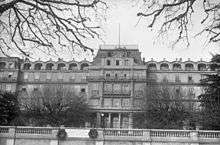International Committee on Intellectual Cooperation
| International Committee on Intellectual Cooperation | ||||||||
| International organization | ||||||||
| ||||||||
| Capital | Geneva | |||||||
| Political structure | International organization | |||||||
| Historical era | Interwar period | |||||||
| • | Creation | 1922 | ||||||
| • | Dissolution | 1946 | ||||||
| ||||||||


The International Committee on Intellectual Cooperation (sometimes League of Nations Committee on Intellectual Cooperation) was an advisory organization for the League of Nations which aimed to promote international exchange between scientists, researchers, teachers, artists and intellectuals.[4][5] It was established in 1922, and counted such distinguished figures as Henri Bergson, Albert Einstein, Marie Curie and Robert A. Millikan among its members.[6][7][8][9]
The International Committee on Intellectual Cooperation (Geneva)

The International Committee on Intellectual Cooperation (ICIC) was formally established in January 1922. Having started out with 12 members, its membership later grew to 19 individuals. The first session was held in August 1922, under the chairmanship of Henri Bergson; its work continued until 1939. During its lifetime, the committee attracted a variety of prominent members, for instance Albert Einstein, Marie Curie, Kristine Bonnevie, Jules Destrée, Robert Andrews Millikan, Alfredo Rocco, Paul Painlevé, Gonzague de Reynold and Sarvepalli Radhakrishnan. The body was successively chaired by:
- Henri Bergson (1922–1925)
- Hendrik Lorentz (1925–1928)
- Gilbert Murray (1928–1939).
The ICIC maintained a number of sub-committees (e.g. on Museums and on Arts and Letters) which also worked with figures such as Béla Bartók, Thomas Mann, Salvador de Madariaga and Paul Valéry.
The ICIC worked closely with the International Educational Cinematographic Institute (Istituto Internazionale del Cinema Educatore) created in Rome in 1928 by the Italian government.
The International Institute of Intellectual Cooperation (Paris)

In order to support the work of the commission in Geneva, the organization was offered assistance from France to establish an executive branch, the International Institute of Intellectual Cooperation (IIIC), in Paris in 1926.[8] However, the IIIC had an autonomous status. It maintained relations with the League's member states, which established national commissions for intellectual cooperation and appointed delegates to represent their interests at the Institute in Paris. While being an international organisation, each of the IIIC's three successive directors was French:
- Julien Luchaire (1926–1930)
- Henri Bonnet (1931–1940)
- Jean-Jacques Mayoux (1945–1946)
From 1926 to 1930, Alfred Zimmern – the well-known British classicist and a pioneering figure in the discipline of international relations – served as the IIIC's Deputy Director.
As a result of the Second World War, the Institute was closed from 1940 to 1944. It re-opened briefly from 1945 to 1946. When it closed for good in 1946, UNESCO inherited its archives and some parts of its mission.[10][11]
References
- ↑ LoN archives 1924, United Nations Offices in Geneva. Picture from this collection.
- ↑ Grandjean, Martin (2014). "La connaissance est un réseau". Les Cahiers du Numérique. 10 (3): 37–54. doi:10.3166/lcn.10.3.37-54.
- ↑ League of Nations archives, United Nations Office in Geneva.
- ↑ Iriye, Akira (2002). Global Community: The Role of International Organizations in the Making of the Contemporary World. Berkeley: University of California Press. ISBN 0520231279.
- ↑ Laqua, Daniel (2011). "Transnational Intellectual Cooperation, the League of Nations, and the Problem of Order" (PDF). Journal of Global History. 6 (2): 223–247.
- ↑ Pernet, Corinne (2014). "Twists, Turns, and Dead Alleys: The League of Nations and Intellectual Cooperation in Times of War". Journal of Modern European History. 12 (3): 342–358.
- ↑ Grandjean, Martin (2016). Archives Distant Reading: Mapping the Activity of the League of Nations’ Intellectual Cooperation. In Digital Humanities 2016: Jagiellonian University & Pedagogical University, Kraków, pp. 531-534.
- 1 2 Intellectual Cooperation and International Bureaux Section, United Nations Office in Geneva
- ↑ Grandjean, Martin (2014). "Intellectual Cooperation: multi-level network analysis of an international organization". Historical Network Research Conference. doi:10.13140/2.1.2069.6329.
- ↑ "UNESCO Archives". Retrieved 20 June 2016.
- ↑ Renoliet, Jean-Jacques (1999). L’UNESCO oubliée : l'Organisation de Coopération Intellectuelle (1921–1946). (French)
| Wikimedia Commons has media related to International Committee on Intellectual Cooperation. |